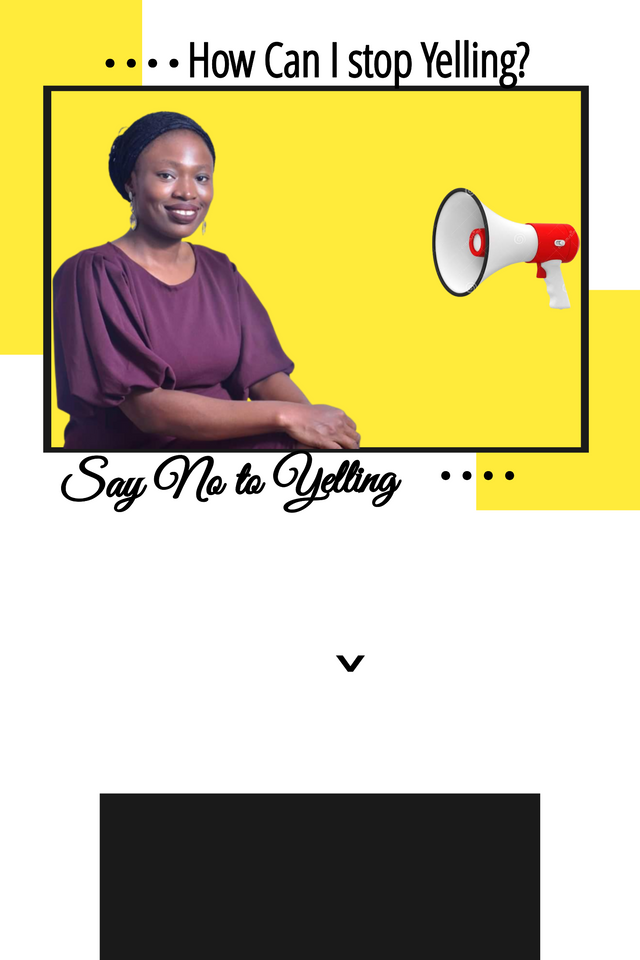WHAT TO DO IF YOU YELL

Image Source:Self Design on Postmaker
Finally, on the subject of yelling, I have identified proven ways to finally stop yelling at your kids
Consider these strategies your yelling recovery manual, a 10-step guide to seizing control of your external voice..
1. Recognize your triggers
Yelling is rarely spontaneous; it is usually a reaction to a specific behavior. In other words, something sets it off. You will have a better chance of avoiding a gasket blowout if you can figure out what causes it. By this perception, you will be able to make wiser decisions, like performing a show for the kids while you're preparing food.

2. Issue a warning to children
It is reasonable to warn children who are delaying bedtime or fighting in the car that you are about to yell. A serious warning can sometimes be enough to get children to back down.

3. Take a time out
If we are devoted to mindfully adjusting our conduct and just taking just few minutes of time out before we do anything, it really helps us practice greater self- control of our emotions

4. Create a "Yes" List
This list of appropriate things to do before yelling or refraining from saying something you'll later regret can be taped to the refrigerator.
From family to family, it will differ.

Image Source: Self Design on Postmaker
5. Explain the lesson later.
Yelling does not convey information; instead, it undermines the validity of parents' worries and motivates kids to tune out rather than listen.
Waiting can be difficult (can you feel the rage rising? ), but exercising self-control in the moment will send a stronger message overall. Later, when you are more at ease, the teaching event will take place, and it will have a much greater impact.

6. Understand what constitutes normal behavior.
Knowing that your children's sibling rivalry, whining, mouthiness, and bedtime aversion are normal and age appropriate can help make the situation less personal. They become coping behaviors rather than tactics designed to drive you insane.

7. Take the initiative.

For example, if getting out of the house in the morning always turns into a shouting match, prepare the night before.
8. Modify your expectations
When it comes to children, keeping expectations realistic is essential. Part of the reason we yell is that our high expectations for an outing or event do not match reality. Only one directive should be issued at a time.
9. Recognize when it is about you rather than your child's misbehavior.
Sometimes we lose it on our children for no apparent reason. Looking back, we realize there was simply no mental space for whatever request had triggered our rage. It's like venting to them because there must be something wrong with us "says one. We apologized profusely and felt terrible. We want to improve for the sake of my kids.
10. Hold a yelling debriefing
Experts advise you to apologize if you inadvertently yelled or said derogatory statements to your child. It takes the sting out of a bad situation and serves as a reminder to our children that we are only human and that our emotions could sometimes potentially trigger us to make statements we regret.
Last Thoughts
It's a win-win situation: yell less, and you'll soon have fewer reasons to yell.
Although some cultures are more emotional than others, and yelling may be more culturally acceptable, yelling at your children is not. Children are terrified of angry outbursts directed at them, but we all lose it on our loved ones on occasion. As a result, regardless of culture, the aftermath is crucial.

Thank you, friend!


I'm @steem.history, who is steem witness.
Thank you for witnessvoting for me.
please click it!
(Go to https://steemit.com/~witnesses and type fbslo at the bottom of the page)
The weight is reduced because of the lack of Voting Power. If you vote for me as a witness, you can get my little vote.
Downvoting a post can decrease pending rewards and make it less visible. Common reasons:
Submit
Downvoting a post can decrease pending rewards and make it less visible. Common reasons:
Submit